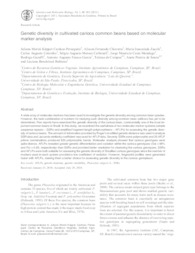Genetic diversity in cultivated carioca common beans based on molecular marker analysis.
Genetic diversity in cultivated carioca common beans based on molecular marker analysis.
Author(s): PERSEGUINI, J. M. C. K.; CHIORATTO, A. F.; ZUCCHI, M. I.; COLOMBO, C. A.; CARBONELL, S. A. M.; MONDEGO, J. M. C.; GAZAFFI, R.; GARCIA, A. A. F.; CAMPOS, T. de; SOUZA, A. P. de; RUBIANO, L. B.
Summary: A wide array of molecular markers has been used to investigate the genetic diversity among common bean species. However, the best combination of markers for studying such diversity among common bean cultivars has yet to be determined. Few reports have examined the genetic diversity of the carioca bean, commercially one of the most important common beans in Brazil. In this study, we examined the usefulness of two molecular marker systems (simple sequence repeats - SSRs and amplified fragment length polymorphisms - AFLPs) for assessing the genetic diversity of carioca beans. The amount of information provided by Roger?s modified genetic distance was used to analyze SSR data and Jaccards similarity coefficient was used for AFLP data. Seventy SSRs were polymorphic and 20 AFLP primer combinations produced 635 polymorphic bands. Molecular analysis showed that carioca genotypes were quite diverse. AFLPs revealed greater genetic differentiation and variation within the carioca genotypes (Gst = 98% and Fst = 0.83, respectively) than SSRs and provided better resolution for clustering the carioca genotypes. SSRs and AFLPs were both suitable for assessing the genetic diversity of Brazilian carioca genotypes since the number of markers used in each system provided a low coefficient of variation. However, fingerprint profiles were generated faster with AFLPs, making them a better choice for assessing genetic diversity in the carioca germplasm.
Publication year: 2011
Types of publication: Journal article
Unit: Embrapa Acre
Keywords: Beans, Feijão, Feijão carioca, Fitomejoramiento, Frijoles, Genetic markers, Genetic polymorphism, Genetic variation, Marcador genético, Marcador microssatélite, Marcadores genéticos, Melhoramento genético vegetal, Microsatellite repeats, Phaseolus vulgaris, Plant breeding, Polimorfismo genético, Repeticiones de microsatélite, Variación genética, Variação genética
Observation
Some of Embrapa's publications are published as ePub files. To read them, use or download one of the following free software options to your computer or mobile device. Android: Google Play Books; IOS: iBooks; Windows and Linux: Calibre.
Access other publications
Access the Agricultural Research Database (BDPA) to consult Embrapa's full library collection and records.
Visit Embrapa Bookstore to purchase books and other publications sold by Embrapa.

